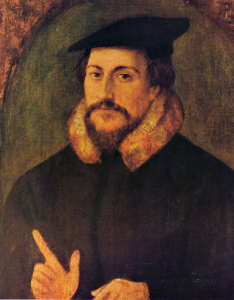
Dear ____:
One of the best things that can happen to you in seminary is to broaden your friendship network. I’m glad you have been getting to know Christians whose backgrounds and opinions are very different from your own.
But actually, that is just the start.
Find some dead friends
I really hope you will pick up a handful of really excellent dead friends.
When you stand and say the Creed you affirm that you believe in “the communion of saints” and that, my friend, is not limited to people who are lucky enough to be alive at the same time as you.
In the first 2000 years of the Church’s life there have been some Christ followers who were pretty wise. They asked really good questions. They probed hard for answers. They left books behind.
In the course of your time in seminary, you need to pick up at least one or two Christian thinkers who can be your friends as the years of life and ministry roll on.
A suggestion: John Calvin
Let me propose one candidate: John Calvin (1509-1564). You haven’t taken a course on the Reformation yet, so let me tell you that most popular opinions about Calvin are worthless gossip.
You need to get to know Calvin first hand.
He wrote commentaries on most of the books of the Bible. If you read his thoughts as you prepare your sermons you will get to know him over time — as well as understanding your text better.
He also wrote a summary of biblical theology called The Institutes of the Christian Religion. If you are wondering what the Bible teaches on a topic, Calvin’s Institutes will give you a clear and coherent exposition.
Calvin is a wise companion on all kinds of things. He is thoroughly biblical and surprisingly fair-minded — and when you actually read him, he’s winsome.
Take prayer. It is a big topic for Calvin. His take is really different from what you find in many popular books on the topic today.
Three little quotations:
What is prayer really for?
The mind should be
freed from carnal cares and thoughts by which it can be called or led away from right and pure contemplation of God, and then not only devotes itself completely to prayer but also, in so far as this is possible, is lifted and carried beyond itself.” (Institutes 3.20.4)
Most Protestant writers today are all about getting God to give you what you pray for. We leave “contemplation” to the Catholics.
Calvin is convinced that God does hear and answer, but he sees that our relationship with God is the core issue. Prayer is about turning rightly toward God. That is contemplation.
It is not about getting what you want. It is about getting God.
Where does prayer come from?
What is the value of prayer? Who should pray? Where does prayer come from, especially if God knows our needs already?
On this Calvin discusses a passage he comes back to repeatedly, Joel 2:23, which was quoted by the Apostle Paul at Romans 10:13: “Whoever calls on the name of the Lord will be saved.
Here’s Calvin:
…invocation arises from faith: for except God shines on us by his word, we cannot come to him; faith, then, is ever the mother of prayer.” (Commentary on Joel 2:23)
Calvin, like Luther, was convinced that faith is what really matters for salvation.
So, what is the evidence that you have faith? Prayer. If you have faith, then faith leads you to pray.
You know you are in need, and you trust that God can help. So you pray.
How do you learn to pray?
But how are you going to learn to pray?
Calvin had ideas about that too:
… calling upon God is one of the principal means of securing our safety, and … a better and more unerring rule for guiding us in this exercise cannot be found elsewhere than in The Psalms…” (Psalms Commentary, preface)
Luther said to learn from the Lord’s Prayer. Andrew Murray tried to take all the biblical imperatives about prayer and turn them into rules. Calvin says to look at the book of the Bible that is almost entirely prayers. Learn from the masters.
The thing is, in the Psalms God’s people pray about everything — heights of joy, agonies of despair, vengeful fits of rage. Some of it is pretty ugly, but it is all prayable — and God seems to have wanted it in the Bible.
So this letter wasn’t supposed to be all about prayer. Prayer is just an illustration of a topic on which Calvin can be very good company.
Find yourself some good dead friends. Keep me posted about who you decide to hang with.
Blessings,
Gary
————
From time to time I offer online classes on prayer, using great teachers like John Calvin as our guides — and using my award winning book Kneeling with Giants: Learning to Pray with History’s Best Teachers.
If you’d like to know about it next time one comes around, click the button below:

Leave a Reply